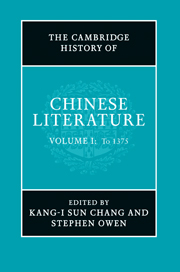Book contents
- Frontmatter
- Introduction
- 1 Early Chinese literature, beginnings through Western Han
- 2 From the Eastern Han through the Western Jin (ad 25–317)
- 3 From the Eastern Jin through the early Tang (317–649)
- 4 The cultural Tang (650–1020)
- 5 The Northern Song (1020–1126)
- 6 North and south: the twelfth and thirteenth centuries
- 7 Literature from the late Jin to the early Ming: ca 1230–ca 1375
- Select bibliography
- Glossary
- Index
- References
2 - From the Eastern Han through the Western Jin (ad 25–317)
Published online by Cambridge University Press: 28 May 2011
- Frontmatter
- Introduction
- 1 Early Chinese literature, beginnings through Western Han
- 2 From the Eastern Han through the Western Jin (ad 25–317)
- 3 From the Eastern Jin through the early Tang (317–649)
- 4 The cultural Tang (650–1020)
- 5 The Northern Song (1020–1126)
- 6 North and south: the twelfth and thirteenth centuries
- 7 Literature from the late Jin to the early Ming: ca 1230–ca 1375
- Select bibliography
- Glossary
- Index
- References
Summary
Eastern Han literature
Overview
The Eastern Han dynasty (25–220), also known as the Later Han, formally began on August 5, ad 25 with the accession of Liu Xiu (5 bc–ad 57) as emperor. His posthumous imperial title was Guangwu (r. 25–57). The Eastern Han lasted until November 24, 220, when the last Han emperor abdicated to Cao Pi (187–226), the founder of the Wei dynasty (220–265). Historians conventionally treat the Eastern Han as a restoration, for it was not technically a new dynasty but the return of imperial authority to a member of the Liu clan, which had lost its claim to the throne during the Xin dynasty (9–23) of Wang Mang (45 bc–ad 23). It took Liu Xiu about a decade to gain control over the entire realm. One of his main rivals was Gongsun Shu (d. 36), who set up a powerful regime in Shu (modern Sichuan). After much difficulty, Liu Xiu’s army defeated Gongsun Shu in December of ad 36.
The Eastern Han established its capital at Luoyang. Although the Eastern Han ruling family had the same surname as the ruling family of the Western Han, their background was quite different. They represented the powerful landowning class, and much of their power was based on the support of prominent families, several of which had a strong interest in literature and scholarship. The first three reigns of the Eastern Han, from about 25 to 88, were a time of domestic stability and foreign expansion. The power of the clans of imperial consorts and the eunuchs was curtailed, and the Han was able to take advantage of a power vacuum in the north to regain control over parts of Central Asia.
- Type
- Chapter
- Information
- The Cambridge History of Chinese Literature , pp. 116 - 198Publisher: Cambridge University PressPrint publication year: 2010
References
- 5
- Cited by



